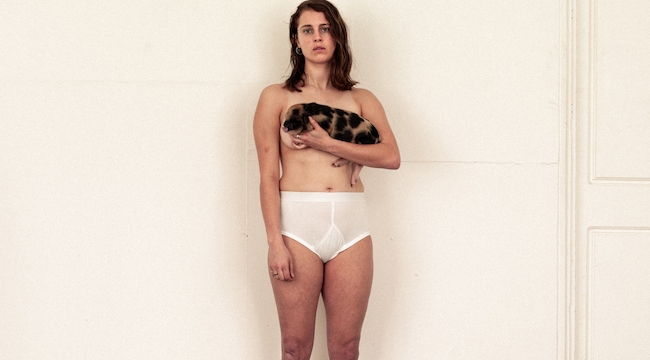
Marika Hackman has never been concerned with genre, so it’s not surprising that her last two records have blitzed the concept all together. In an interview back in 2013, she explained that what draws her to music, more than any one specific sound, is dark feelings that stray toward playfulness. “The songs I’m drawn to are the ones, if you strip them back, that have similar thoughts, a melancholy vibe that for some reason attracts me,” she explained. “Quite dark and sometimes a bit playful, I think as far as a genre it’s hard to pin one down.”
Hackman started her career as a musician with a series of fascinating, eclectic EPs for the independent UK label, Dirty Hit, beginning with a covers EP and moving into original songwriting that was gentle and folkish, but still prickly and restless. Her first full-length album, We Slept At Last, came out in 2015, a porcelain record full of lush songwriting and intricate melodies, and it earned her a spot opening for another famed gentle-furious British songwriter, Laura Marling.
While the record resonated in indie circles, it didn’t have quite the impact Hackman wanted it to. This selection of slow and gentle songwriting pigeonholed her work as “folk-pop,” a label she forcibly bucked in 2017, signing to the storied Pacific Northwest indie Sub Pop and fleshing out her sound in a big way for her next album, partially by working with an all-female London quartet as a backing band, The Big Moon. She introduced her second full-length record with the slyly raucous “Boyfriend,” a minor hit that detailed the seduction of a woman away from her straight male partner and into Hackman’s arms.
The song also doubled as a coming-out for Hackman, who previously hadn’t been as open about her queer identity, at least in the public eye. Aside from the standout hit, I’m Not Your Man helped to further establish the British singer/songwriter with American audiences, and expanded her palette far beyond the confines of soft, acoustic melodies. Never straying all the way away from some semblance of sweetness, this third album proved there could be a bite lurking underneath the smile, revealing her to be an even more dynamic artist.
Coming out two years later, Any Human Friend builds on the foundation that I’m Not Your Man established; if Man was raucous, Hackman’s third album is pure anarchy. “They’re saying I’m a godsent gift / And all you f*ckers want my d*ck,” she snarls on the record’s second track, “The One,” a bait-and-switch rocker after the subdued album opener, “Wanderlust,” which alluded back to Hackman’s gentle 2015 sound. And even the album cover of her third album pushes the envelope further, featuring the artist wearing only a pair of white tighty-whiteys and holding a cat to cover her chest, a visual that alludes to the work of Dutch photographer Rineke Dijkstra, who is best known for “unfiltered photos of mothers just after they gave birth.”
Of course, Hackman isn’t a mother, but what she’s birthed on Any Human Friend is one of the most compelling explorations of queer female sexuality of 2019. There’s always something delightful about queer women using phallic imagery to convey a power play, and that ferocious line on “The One” isn’t the only time Hackman brings up the penis, an otherwise useless appendage when it comes to her sexual pleasure. Continuing in that playful, dark vein on the same song, she sings “I’ve got BDE / I think it’s a venereal disease,” a fitting summation of how plenty of queer women would typify the unrelenting force of heteronormative masculinity. She delivers the line with the deadpan insouciance of Courtney Barnett, an apt reference for the wry, songwriting-driven feel of Any Human Friend, an album that slides into mischievous territory whenever possible.
Elsewhere, Hackman is explicit, not about the male form, but about her intimate interactions with other women. “All Night” chronicles an encounter between two women in a way that few pop songs do; later, on the cleverly titled “Hand Solo,” she interrogates the way that masturbation — or any sex without penetration — has historically been dismissed as not “real” sex. Horniness aside, the basis for many songs on Any Human Friend is the grief that accompanies a romantic breakup, which is, unsurprisingly, a completely universal feeling, relatable no matter who you’re in love with.
This is where the album really finds its stride, balancing carnal pleasures and the thrills of sexual intimacy with the sometimes devastating fallout that can occur when those relationships grow more serious, and eventually fall apart. On songs like “I’m Not Where You Are” and “Send My Love,” Hackman ruminates on endings, loneliness, and self-loathing, creating a juxtaposition with the more explicit songs on the record, and a full-fledged portrait of all that love can contain. And though it may be an enormous leap forward sonically, and much more open lyrically, as a whole the album typifies everything Hackman has always been drawn to — all of the dark and playful parts of human life.
Any Human Friend is out now via Sub Pop. Get it here.






